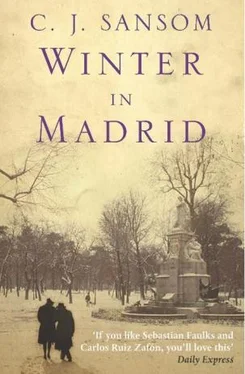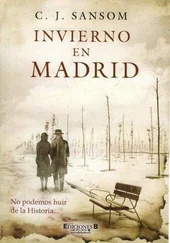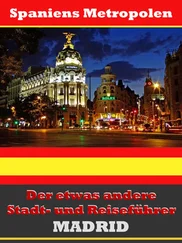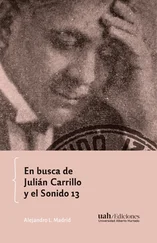He renewed the conversation as they drove away. ‘They say Churchill sent Sam here to get him out of the way,’ he confided cheerfully. ‘Can’t stand him, doesn’t trust him either. That’s why he put the captain in charge of Intelligence; he’s an old friend of Winston’s. From his days out of government.’
‘Aren’t we all supposed to be on the same side?’
‘There’s a lot of internal politics.’
‘You can say that again.’
Tolhurst smiled sardonically. ‘Sam’s a bitter man. He wanted to be Viceroy of India.’
‘The in-fighting can’t make anyone’s job easier.’
‘Way things are, old boy.’ Tolhurst looked at him seriously. ‘Best you should know the score.’
Harry changed the subject. ‘When I was at school I remember some adventure books by an Alan Hillgarth. Not the same man, I suppose?’
Tolhurst nodded. ‘The very same. Not bad, are they? Ever read the one set in Spanish Morocco? The War Maker . Franco comes into it. Fictionalized, of course. The captain admired him, you can tell.’
‘I haven’t read it. I know Sandy Forsyth liked them.’
‘Did he now?’ Tolhurst said with interest. ‘I’ll tell the captain. That’ll amuse him.’
They drove through the centre into a maze of narrow streets of four-storey tenements. It was late afternoon and the heat was starting to lift, long shadows falling across the road as Tolhurst steered carefully over the cobbles. The tenements had had no attention for years, plaster was falling from the brickwork like flesh from skeletons. There were several bombsites, heaps of stone overgrown with weeds. There were no other cars around and passers-by glanced at the car curiously. A donkey pulling a cart shied away into the pavement as they passed, nearly unseating its rider. Harry watched as the man steadied himself, mouthing a curse.
‘I was wondering,’ he said, ‘how I was recruited.’ He kept his tone casual. ‘Just interest. Never mind if you can’t tell me.’
‘Oh, that’s no secret. They were hunting up Forsyth’s old contacts and a master at Rookwood mentioned you.’
‘Mr Taylor?’
‘Don’t know the name. When they found you knew Spain they were in seventh heaven. That’s where the interpreter idea came from.’
‘I see.’
‘Real piece of luck.’ Tolhurst skirted a crack in the road by a bombsite. ‘Did you know, the embassy here was the first piece of British soil to be hit by a German bomb?’
‘What? Oh, during the Civil War?’
‘Hit the garden by accident when the Germans were bombing Madrid. Sam’s had it put back in order. He has his good points. He’s a first-class organizer, the embassy runs like clockwork. You have to give the pink rat his due.’
‘The what?’
Tolhurst smiled confidentially. ‘It’s his nickname. He gets these fits of panic, thinks Spain’s about to come into the war and he’ll be shot, has to be persuaded not to run off to Portugal. D’you know, the other evening a bat flew into his study and he hid under the table, screaming for someone to take it away. You can imagine what Hillgarth thinks. But when he’s on form Sam’s a bloody good diplomat. Loves strutting about as the King-Emperor’s representative; the Monarchists all go soppy at anything to do with royalty, of course. Ah, here we are.’
Tolhurst had pulled up in a dusty square. There was a statue of a soldier in eighteenth-century dress on a pedestal in the middle, one arm missing, and a few fly-blown shops with half-empty windows. Tenements ringed the square, the windows behind the rusty iron balconies shuttered against the afternoon heat. The place must have had style once. Harry studied them through the window. He remembered a picture he had bought in a back-street shop in 1931: a crumbling tenement building like this, a girl leaning out of a window, smiling as a gipsy serenaded her underneath. He had it in his room at Cambridge. There was something romantic about decaying buildings; the Victorians had loved them, of course. But it was different if you had to live in them.
Tolhurst pointed to a narrow street leading north, where the buildings looked even more down at heel.
‘Wouldn’t go down there if I were you. That’s La Latina. Bad area, leads across the river to Carabanchel.’
‘I know,’ Harry replied. ‘There was a family we used to visit in Carabanchel when I came in 1931.’
Tolhurst looked at him curiously.
‘The Nationalists shelled it badly during the Siege, didn’t they?’ Harry asked.
‘Yes, and they’ve left it to rot since the Civil War. See the place as full of their enemies. There are people starving down there, I’m told, and packs of wild dogs living in the ruined buildings. People have been bitten and got rabies.’
Harry looked down the long empty street.
‘What else is there you should know?’ Tolhurst asked. ‘English people aren’t very popular generally. It’s the propaganda. It’s never more than dirty looks, though.’
‘How do we deal with Germans if we meet them?’
‘Oh, just cut the bastards dead. Be careful about greeting people who look English on the streets,’ he added as he opened the car door. ‘They’re just as likely to be Gestapo.’
Outside the air was full of dust, a breeze lifting little whorls of it from the street. They took Harry’s case from the car. A thin old woman in black crossed the square, a huge bag of clothes on her head supported by one hand. Harry wondered which side she had supported during the Civil War, or whether she had been one of the thousands without politics, caught in the middle. Her face was deeply lined, her expression tired but stoical; one of those who endured – somehow, only just.
Tolhurst handed Harry a brown card. ‘Your rations. The embassy gets diplomatic rations and we distribute them. Better than we get at home. A lot better than the rations they get here.’ His eyes followed the old woman. ‘They say people are digging up vegetable roots for food. You can buy stuff on the black market, of course, but it’s expensive.’
‘Thanks.’ Harry pocketed the card. Tolhurst went over to one of the tenements, producing a key, and they entered a dark vestibule with cracked flaking paint. Water dripped somewhere and there was a smell of stale urine. They climbed stone steps to the second floor, where the doors of three flats faced them. Two little girls were playing with battered dolls in the hallway. ‘ Buenas tardes ,’ Harry said, but they looked away. Tolhurst unlocked one of the doors.
It was a three-bedroomed flat, such as Harry remembered would often house a family of ten in crowded squalor. It had been cleaned and there was a smell of polish. It was furnished like a middle-class home, full of heavy old sofas and cabinets. There were no pictures on the mustard-yellow walls, only blank squares where they had hung. Dust motes danced in a beam of sunlight.
‘It’s big,’ said Harry.
‘Yes, better than the shoebox where I live. Just the one Communist Party official used to live here. Disgrace when you see how most people are crowded together. Left empty for a year after he was taken away. Then the authorities remembered they had it and put it up for rent.’
Harry ran a finger along the film of dust on the table. ‘By the way, what’s this about Himmler coming here?’
Tolhurst looked serious. ‘It’s all over the Fascist press. State visit next week.’ He shook his head. ‘You never get used to the idea that we might have to run. There have been so many false alarms.’
Harry nodded. He’s not really brave, he thought, no more than I am. ‘So you report directly to Hillgarth?’ he asked.
‘That’s right.’ Tolhurst tapped the leg of an ornate bureau with his foot. ‘I don’t get to do any actual secret work, though. I’m the admin man.’ He gave a self-deprecating laugh. ‘Simon Tolhurst, general dogsbody. Flats found, reports typed, expenses checked.’ He paused. ‘By the way, make sure you keep a careful note of everything you spend. London’s red-hot on expenses.’ Tolhurst looked out of the window at the central courtyard where patched washing flapped on lines strung between the balconies, then turned back to Harry. ‘Tell me,’ he asked curiously, ‘does Madrid look much different to when you were here under the Republic?’
Читать дальше












